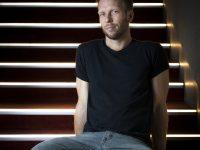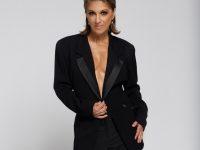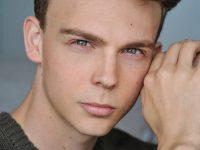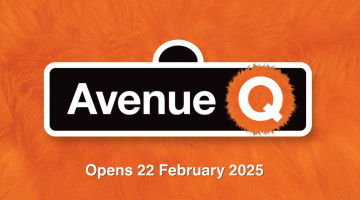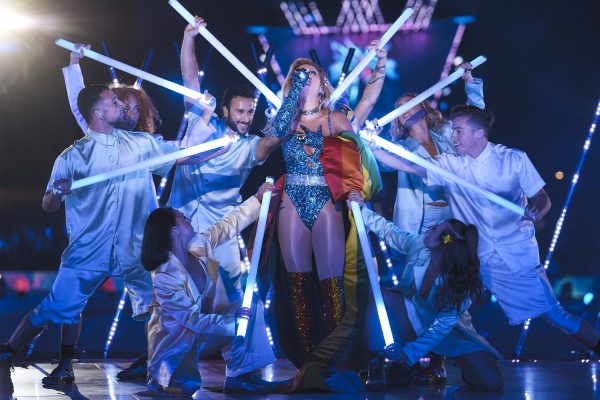
Will it be Third Time a Charm for Christopher Tsattalios in LA?
The Highs and Lows of An Aussie Dancer Breaking into the US Industry
Interview by Chris Duncan
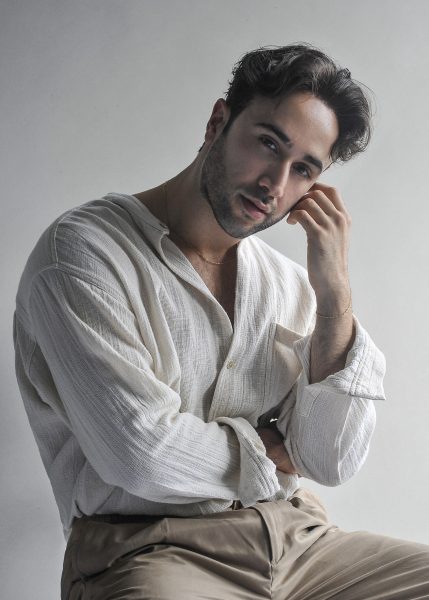 As a successful Australian dancer making the transition to a career in the United States, Christopher Tsattalios, 29, has seen both the struggles and successes possible. Usually based in Los Angeles, Christopher has a more realistic experience to share of trying to build his career as a performer in the US as he has seen his fair share of heartbreaking lows, crushing rejections and eventual high notes of success after his determination to stick it out and re-invent himself finally presented some opportunities.
As a successful Australian dancer making the transition to a career in the United States, Christopher Tsattalios, 29, has seen both the struggles and successes possible. Usually based in Los Angeles, Christopher has a more realistic experience to share of trying to build his career as a performer in the US as he has seen his fair share of heartbreaking lows, crushing rejections and eventual high notes of success after his determination to stick it out and re-invent himself finally presented some opportunities.
First moving to LA at the age of 23, it took two long stints in the entertainment capital before Christopher started gaining some traction in the US dance industry and booking quality jobs. Then, after several years of slogging it out and finding himself in a comfortable position at last, working on incredible projects that saw him re-define his career goals, Covid19 forced Christopher back home to Australia in 2020.
Now planning his return to the US once international borders re-open, Christopher has valuable insight to share with other aspiring Australian dancers aiming to live and work in the States. Chris Duncan recently interviewed Christopher Tsattalios about the highs and lows of building his career, and agreed that the pursuit is definitely not for the fainthearted dancer.
***
Q: Tell me what you have been doing in the US since you moved to LA.
Gosh! Where do I start? When I first moved to Los Angeles I had a really difficult time … it was quite a struggle. I was 23, and it was hard because it was a whole different life, a whole different ball game. You think everything you learn as a professional dancer here (Australia) works for you over there, but it doesn’t sometimes. You go into auditions and can get cut in seconds … I had so much to learn. When I first moved there my mind was blown, because I just felt like I was so behind everyone. It’s just a different life, a different country, and it’s not going to be the same.
But you know, with all those crazy moments and the downtime, I really made sure I was absorbing everything I could to figure out how I was going to work here … ‘how do I do this?’ Because at first I just wasn’t working. I’d get cut before I even danced! I needed to figure that out, and it was the most amazing learning experience. I was lucky enough to figure it out and I did get to work with Janet Jackson my first year there, which was crazy cool. And that was after nine months, so it was nice to get the ball finally rolling … it kind of got my confidence back after being down for so long.
And then, of course, there are other amazing things I’ve worked on like a Netflix film with Debbie Allen and Dolly Parton; that was the craziest experience and was filmed in Atlanta. And also working with Paula Abdul and her Las Vegas residency was definitely exciting.
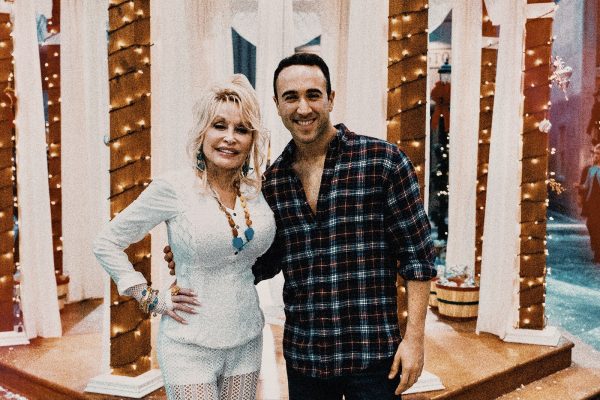
Q: It’s so good to see you and other Australians, like Tash Marconi and Renee Ritchie, making it happen in the United States: How do you keep emotionally and mentally strong to push yourself to keep trying?
It’s not for the fainthearted. I love talking about that aspect more than what I’ve actually done workwise, because I feel like a lot of young Aussie dancers go and get a visa and move to the States unprepared; and I just always try to pre-warn them that everyone’s journey is different.
Some people get off the plane and they book a job easily, but that’s not everyone. It took me two visa applications and trips to actually really get it happening for me in the States. As I said, I had a really rough first time; I wasn’t working for a long time; I had barely any money left; I didn’t have a place that was mine. I also had a really hard time when in my first year being there, when my mum passed away back home. That crushed me beyond everything else that I was going through. But they were all learning experiences for me.
I love being honest about that because I feel people think that we all move there and just live the dream, but that’s so far from my story. I didn’t get off the plane and live my dream. I got crumbled to pieces basically, and then I built myself back up. Surviving in LA isn’t just about being a great performer; you have to be so strong. And it broke me and I had life break me, and then I put myself together and I thought ‘how am I going to make it work?’ So, I just picked myself up and went back to LA and was so focused and dedicated to making this my life.
Q: That sounds incredibly difficult… to start from scratch again and be prepared for how expensive the process can be and to also have a fall back position…
Yes, I think that’s why it worked for me the second time I went. I learned from my mistakes and I think I was also a little bit naive too; thinking just because I was working in Australia that I was going to work there as easily. But I definitely don’t regret any of that. I think all those hard times are always the best because that’s when you can really change your whole outlook on life and change yourself. So that’s what I always try to tell younger performers in Australia who just want to get a visa and dance in the States… it’s so much more than that. I’m not trying to scare them, but I want them to be mentally prepared for what could happen.
Q: So you worked with Janet Jackson and Paula Abdul, and what else did you get to do in the US before coming back home? I assume you came back because of COVID?
Correct. Like I said, I learned from my first time and when I returned the second time I was honestly living like my absolute dream life. Not necessarily with jobs, but just how I was feeling every day. It was like when I was a kid and wanted to move the America, it was the most exciting thing I imagined my life would’ve been like. I always knew that I wanted to live there. So it was really exciting. I found a really amazing group of friends and I got to work at The Playground, which is a dance studio in LA. Robin Antin and Kenny Wormald are the owners, and they signed my Visa’s and got me back over. They took me under their wings and kind of mentored me. I got to just experience so much work with them, such as training a lot of amazing up-and-coming artists. Singers would get sent to us from Capitol Records and I would get to movement coach them for hours every day and train them. Now they’re super successful artists and it’s so rewarding.
For me, finding different work the second time around in LA wasn’t necessarily always about me being on stage. It was actually about nurturing a lot of people and getting them on stage and seeing them shine. I discovered a different side of me as a dancer. For instance, I got to work on The Masked Singer, which was so cool and my contestant actually went on to win the show. And I’ve never won anything in my life! … no dance trophy or anything. (haha) My other contestant on the show was Jojo Siwa (originally from Dance Moms) and we clicked immediately and became great friends and I got to choreograph a lot for her. She’s just such a hard worker and great person.
Aside from all that, I was finding different parts of me this time around, like going back into my singing and acting, which was super exciting working with vocal coaches and acting coaches, and kind of getting all that happening and was I going for parts. I wasn’t getting the parts but at least I was getting called in to read scripts. It was just an epic experience to finally be stepping out of my comfort zone. And I love that this time I was terrified almost every day because people were throwing me into so many different fields that I haven’t touched before.
Q: When did you work on US version of The Masked Singer?
Last year in 2020, I worked on it in January, it aired February and then March is when everything was shut down due to Covid.
That show was one of my favourite things to work on as a choreographer, because it was just so bizarre you could do anything! The creators would be like, ‘so in today’s routine I want them to be cheerleaders, but they’re going to be at church, but then like they’re aliens’ … and you’re like thinking ‘sure but how do I come up with steps for that?’ It’s like working in a kid’s playground but you just do it. It’s just so much fun.
Q: Obviously COVID has affected our industry so dramatically, but have you been able to do any work while back home?
I’ve managed to find my feet again in Australia. It takes a while for people to realise you’re actually back in the country. There are also other the challenges… like I’ve been away and experienced all these amazing new things, and when you return some people still want to box you in the same thing you were doing beforehand. It can be hard to break free of that. It can be a slow start when you come back home … saying ‘I’m here, but I want you to know I’ve changed and I I’ve got some new things and can we try it?’
Since I’ve been back I’ve worked on a couple things here. Probably the most like special thing that I’ve done since COVID happened, would have been performing with Rita Ora at Sydney Mardi Gras 2021. It was unreal! I hadn’t been on stage since Paula Abdul’s last show in Vegas in February 2020. I hadn’t had that feeling of walking on to stage and hearing an audience screaming that raw for a year, and being in that terrified moment where anything can happen live. And I’ve also worked on a couple TV commercials doing choreography. It’s been tough because our industry really just suffered.
It’s been also beautiful in a way, because I’ve also connected with so many people online that I haven’t been in touch with for years. Like yourself Chris! I’ve been able to teach and meet a lot of students via Zoom that I wouldn’t have ever been able to if I’d been in America. So it’s been really rewarding in that way. The studio owner would literally write to me the next day saying how happy the students were and they can’t stop talk about it, and how I didn’t just give them a dance class but changed them with what I had said. I can get emotional after a Zoom class because the kids a re so grateful … we’re all trapped in this lockdown. So there is beauty in the craziness too.
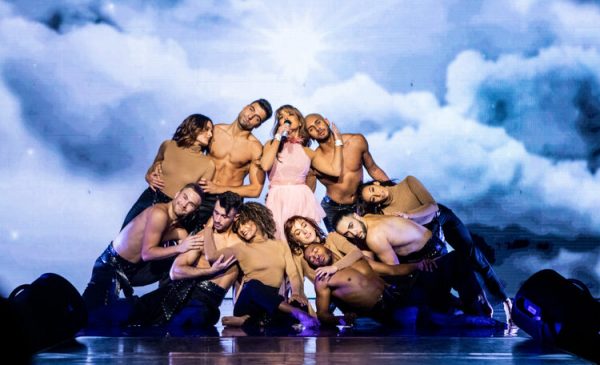
Q: When are you hoping to head back to the USA? And do you have any opportunities opening up there?
I’m hoping for next year. Realistically mid-2022 would be easiest, because again, I have to go through the visa process and pay for it all and figure out how I’m going to get back and work. I don’t want to put too much stress on myself so I feel like somewhere around midyear would be nice.
I’ve been offered a lot since being back in Australia and I’ve actually missed a lot because I’ve been back. They ask if I can come over for a job, and I could, but then when I come back I have to quarantine and it may not be worth it for me. And a lot of projects have fallen through that I would’ve had, so people are waiting now, as they understand my position. So I feel like when I go back, it’ll just be a matter of making sure people know that I’m back. And yeah, just jumping straight in and going for it. I’m feeling like super ready for that again, which is exciting.
Q: What would you say is the main think you have learned as a performer/artist from your time in the US?
Just being more confident that I have something to offer. A lot of the time dancers are pushed to the back and we think we can’t achieve more then what we are given but we contribute an incredible amount to movies/stage/music videos. We share so much joy and passion and we are more than just a ‘back up dancer’. So being confident is okay. People get that confused with cockiness. You have to stand your ground, be strong mentally and physically and know your worth. Set your bar higher. You’re capable of achieving way more then you think, and of achieving all your dreams if you put all the work in. That’s something I’ve learned a lot from performers in LA; they walk into a room ready to work because this is their life.
Q: What advice would you have for dancers coming through the ranks now that may have the goal of working the USA?
I think my best advice, and this is something that I learnt from Paula Abdul as well, would be to make sure that you are exercising all aspects of your field. So, you want to be a backup dancer, but there’s not always going to be artists that can provide that for you or you might not get that job. So, in that downtime, when you’re not working, you need other skills to survive. You need to get through. So, work with your singing teacher, get an acting coach. If you have another love for something, it might not even have anything to do with entertainment, just anything, make sure you are actually exercising that craft. We tend to kind of just focus on one thing, like dance, but everything else is going to help you get through that and elevate your main skill. This is especially important for dancers, because dance doesn’t last forever.
Also I think the most important thing is to enjoy yourself. We can be so intense, but just stop and smile and know where you are sometimes. When you’re on set, look at the stage and take it in, when you’re on stage, look at the audience and take it in. When you’re on set, look at the cameras, look at the room, look at the people that you’re with, take it all in. Just enjoy yourself, be great, and trust that you’ve got it. Be present.
***

